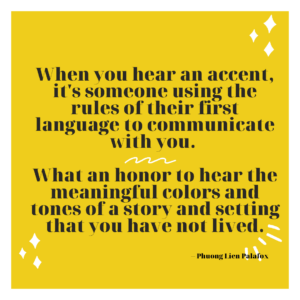What If They Don’t Learn English
I had just spent the morning talking about Difference versus Disorder. Is the child still learning his second language of English or is there a true disorder? It was time for lunch, and I found myself sitting in a car alongside five SLPs. Today, I want to talk about a question that was asked during that short drive. First, she prefaced by saying, “I’m not sure if it’s okay to ask this.” Understanding the gumption it takes to ask a question, I said, “Please do.” She continued, “I know people who live in the United States, and they never learn to speak English. What do you think about that?”
I am very okay with someone not learning English as a member of our country. Here’s why.
Let’s Get Personal
As the eldest of three, my days prior to kindergarten existed alongside Vietnamese speakers. Má and Bá, refugees from a war, spoke Vientamese with one another and my siblings and me. Mandarin Chinese was spoken between them when they did not want us to understand their hushed conversations, Cantonese was spoken when they saw friends at the Asian Market, French was spoken by Bá during his fatherly soliloquies and English was spoken in public to get our needs met at public venues. “Ai wan two poun cat-fit/I want two pounds of catfish,” Má would asked the butcher weekly at Albertson’s.
When visiting Nhè, my paternal grandmother, I spoke Vietnamese. When visiting A Pó, my maternal grandmother, I spoke Vietnamese. Outside of the media influences of Mr. Belvedere, Webster and the Golden Girls, my world was in Vietnamese until the advent of school. With time and comfort, I would bring English home to my siblings. It was also at this time, circa the mid 80’s, that I began to understand the perceived value of having an accent. By the age of six, my pronunciation of multi-syllabic words and consonant blends and use of conjugated English verb forms superceeded my parents’ skills. I began to see and feel the frustration of the employee who could not understand my father’s request for car parts at Western Auto. My mother sat and practiced vocabulary words from Richard Scarry’s Best Word Book Ever–looking at 6-year-old me to guide her pronunciation.
As I look back on this time, I understand the woes of learning a second language. I also understood the societal pressures to erase the narrative that sustained my family for decades prior to their arrival in the United States. And, finally, I swallowed the realization that their efforts to produce specific grammatical rules and consonant sounds, coincidentally, would not earn equity and respect in their new setting. They would always be viewed as “less than.” My environment was telling me that the value of English is greater than other languages, including my own native Vietnamese.
Statistics 101
Let’s talk about some data. The most common language in the world is Mandarin. It is spoken by 1.1 billion people in the world. English follows with 983 million speakers, and 544 million people speak Hindustani (literary forms of Hindi/Urdu). More than half of the people in the world speak two or more languages. India has 23 official languages, Zimbabwe has 16 official languages and Singapore has 4 official languages. What about my home country of the United States of America? There is no official language; however, 20% of us are bilingual. This equates to approximately 60 million people. The data is telling me that English is one of 6,500 languages spoken in the world, and it holds no more value than any other language.
History 101
Now, let’s add a history lesson to this dialogue. There have been historical instances of language discontinuation in the United States. Native Americans were forced to attend boarding schools taught in English. When speaking their native languages, they were punished. Plantation owners worried that their slaves were plotting against them. As a result, English was forced to be spoken exclusively.
The sentiments above have also impacted education. Research states that native languages should be spoken at home to best provide a language foundation for children attending schools primarily taught in English. Nonetheless, families are continuously and erroneously told that the best thing to do is to “just speak English at home.” This callous recommendation has contributed to parents speaking to their child(ren) in a foreign language, children not obtaining a robust language model at home, the denial of a culture attached to the language and miscommunication between family members that have lasting impact.
It appears that the debate regarding the value of English does not necessarily apply to the actual language. Rather, it is about the value (or lack therof) of the individuals who are speaking a language other than English.
Speech-Language Pathology 101
Now, as a bonafide speech-language pathologist with expertise in supporting our Engish Language Learners, I think about why we all communicate, and it boils down to four functions. We communicate to request, deny, seek information and socialize. Case in point:

So, we speak the language that meets the four functions of communication the quickest. If needs are being met, there is not a need to speak another language (or use non-verbals). And, the language we understand and speak is the language exposed to us at birth. Phương speaks Vietnamese, James speaks English, Nils speaks French, Katie communicates in American Sign Language, Eileen speaks Mandarin, Bita speaks Farsi and Nada speaks Arabic. It is all a matter of chance and need.
Also, I want to address accents. An accent is merely someone speaking their second language with the rules of their first language. That’s it. As someone who has completed assessments in Vietnamese, French and Japanese these last few days, I often have parents apologize to me, “I’m sorry. My English is not good.” This is when I look at them in the eyes, and I say, “What a gift you are giving your child in speaking your most meaningful language. Thank you for that. And, your English is perfect just the way it is.”
Humanities 101

The initial question asked, “What if people never learn English?” The information presented in this post demonstrates that, as a language, English is not inherently more valuable than any other language. It serves the four functions of communication in the same manner as the 6K+ languages that exist alongside humankind. In turn, we need to ask ourselves why an emphasis is placed on it. The truth is that the value placed on English is a complicated, deep-rooted problem derived from generations of xenophobia. Now, let us turn this initial question around. I ask you, “What can you do to connect with the person who speaks a different language?” The answer is already embedded within your commonalities as humans–lead with humanity.




What a beautiful article to wake up to. ??!!!
Thank you, Laura. I give you the prize for fueling my SLP-heart this week.
Thank You Sooooo much for this article. I’ve been working as a bilingual SLP for 20+ years. It still boggles me that monolingual americans have such an issue with people speaking a second or third language and feel that they are disordered because they can’t grasp the English language by the time they are in Second grade.
Sonia,
Then, I am glad we are talking about this. Sharing our stories and experiences with language, I think, helps. Thank you for advocating for our students :).
Great article! Thank you for shedding light on such an important topic.
-Suzanne
Thanks, Suzanne. Let’s keep the conversation going.
My first husband was an Armenian from Iran. He spoke Armenian and Farsi and a smattering of Turkish and Arabic. He was educated to read and write in Farsi and didn’t learn English until he came to the United States in the early 70’s to attend LSU. He managed to earn a PhD and was successful in his field. His mother lived with us and tried very hard to learn enough English to meet the 4 functions of communication. I struggled to learn enough Armenian to do the same for her. But somehow, we made it work for many years. Each of us valued what the other brought to the family–a rich assortment of language and culture. I share this only to say that I can relate to your thoughts and observations.
Emily,
Thank you for sharing your family’s narrative. You bring up a a really good point. There have times in my life when I was able to communicate with someone else when we did not have a common language. It’s lovely how we can convey our wants, needs and opinions when giving the time to interact and connect. Thanks so much for reaching out.
Thank you for writing this. It’s such an empowering and accurate perspective
Thank you, Jessica. Here’s to our continued work in sharing stories and persectives.
Phuong, thank you so much for this terrific article! As a bilingual SLP that has been in the field for almost 4 decades, I am so pleased that the important value of multilingualism is finally being promoted. My early days of espousing this message often felt like I was blowing into the wind. Keep up the good work that you and Bilinguistics are doing!
Thank you, Laura, for speaking up for our diverse (and lovely) populations throughout the tenure of your career. Our messages, at times, may not be heard. Nonetheless, it’s so very important. So, collectively, we shall keep speaking up and speaking out–in many valuable, relevant languages!